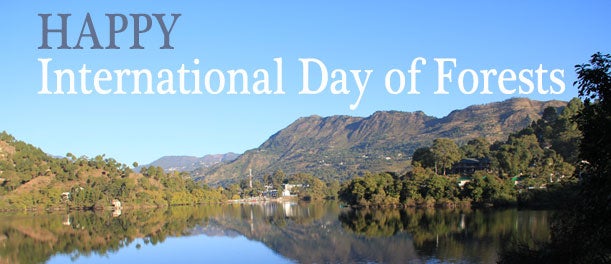

Today, we celebrate the importance, history, and future of the world’s forests. Currently forests provide a multitude of unique forms of biodiversity, protection from desertification, and offer livelihoods and employment to over a billion people worldwide.
Sadly, the world’s forests keep on diminishing due to multiple factors. Over the last 10 years, 130 million hectares of forest, an area that is roughly twice the size of France have been lost to other purposes. Often a lack of knowledge or information will lead to national and private sector policies that are unsustainable for forests.
Recently, steps have been taken to closely monitor deforestation, on the 19th of February 2014 Google and the World Resource Institute plus other partners released a real time tracking tool to monitor global deforestation called the Global Forest Watch. The Global Environment Facility participated in the creation of this tool to help track, study and stymie global deforestation.
The Global Environment Facility has also taken steps in reducing the loss of our forests investments in projects around the world. The GEF has invested over 169 million US dollars every year for the past four years as part of the Sustainable Forest Management / Reducing Emissions from Deforestation and Forest Degradation initiative (SFM/REDD+).
The GEF is in a unique position to be able to support the maintenance of the multiple benefits of forests with the combined guidance (and as financial mechanism) of the three Rio Conventions and in cooperation with platforms such as the United Nations Framework on Forests (UNFF), it is in a prime position to help developing countries find and establish a long term vision for their forests.
The GEF hopes to continue this trend in 2014 and onwards with a grant of 750 million dollars that will mobilize up to 5 billion dollars in co-financing for a whole range of SFM initiatives over the next four years. The goal of the GEF over the next few years is to reduce forest degradation and loss, maintain the range of environmental products and services derived from forests as well as enhancing sustainable livelihoods for local communities and forest dependent people.
The future strategy of the GEF will bring in more input from the private sector and will be applicable to all forests, tropical and dryland forests alike as well as trees outside the forests.
Read more about the GEF’s future plans for this sector.
The GEF is proud to be a member of the Collaborative Partnership on Forests, to find ways of improving forest management and conservation and the production and trade of forest products whilst forming increasingly close and valuable strategic partnerships with one another, benefiting from shared expertise and pooled resources.
On this occasion, the GEF Small Grants Programme celebrates indigenous communities' contribution to forests conservation. Save Our Species (SOS), the GEF's partner in biodiversity conservation, also published two success stories: one is on the discovery of a major population of the rare ancient plant Sinkhole Cycad; the other is on the work of the rangers in Than Lap Park Thailand as they try to protect its Siamese Rosewood from poachers shipping it across the border for sale in international markets.